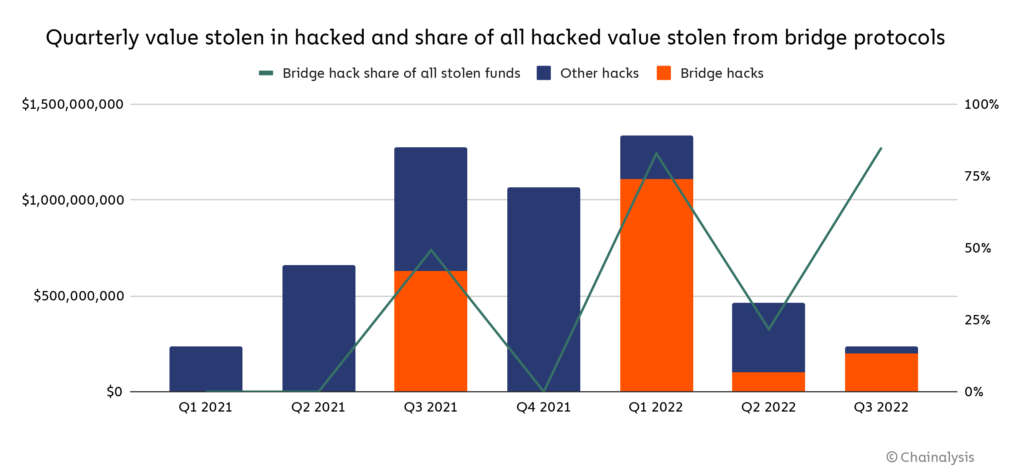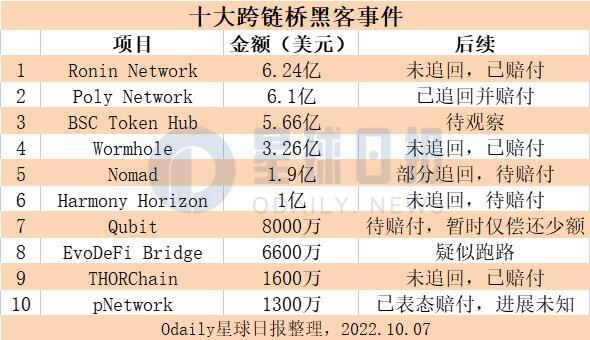回顾史上规模最大的十次跨链桥攻击
跨链桥又双叒叕出事了。
今日早间,BNB Chian 跨链 桥 BSC Token Hub 遭遇攻击。黑客利用跨链桥漏洞分两次共获取 200 万枚 BNB,总价值高达 5.66 亿美元。关于此次事件的具体过程,Odaily 星球日报已在《解析:约5.66亿美元BNB被盗全过程》一文中做了详细梳理。
跨链桥一直都是黑客事件的高发区,Chainalysis 在八月初发布的一份报告中曾提及,跨链桥相关的金额损失已高达 20 亿美元,其中大部分发生在 2022 年间,占今年行业总数据的 69%。
 即便是 BNB Chian 这次高达 5.8 亿美元的超大额资金损失,放在跨链桥的“黑历史”中也只是堪堪挤进前三名。下文中,Odaily星球日报将对过往十次较大规模的跨链桥黑客事件再做一次简单复盘,希望所有开发团队都能以史为鉴,提高警惕。
即便是 BNB Chian 这次高达 5.8 亿美元的超大额资金损失,放在跨链桥的“黑历史”中也只是堪堪挤进前三名。下文中,Odaily星球日报将对过往十次较大规模的跨链桥黑客事件再做一次简单复盘,希望所有开发团队都能以史为鉴,提高警惕。

1. Ronin Network
今年三月下旬,Axie Infinity 侧链 Ronin Network 的跨链桥遭到攻击,损失总额高达 6.24 亿美元。
根据后续各方的披露,Ronin所遭受的攻击系社会工程学攻击。首先,一家虚假公司的员工通过领英联系到了 Axie Infinity 和 Ronin 开发商 Sky Mavis 的员工,并邀请他们来工作;随后,Sky Mavis 的一名员工在面试后获得了假 Offer,在他下载了伪造的 Offer 文件之后,黑客软件渗透到 Ronin 系统中,并接管了 9 个验证者节点中的 4 个;再然后,黑客通过 Sky Mavis 控制了 Axie DAO ,后者曾允许 Sky Mavis 代表其签署各种交易;最终,黑客控制了绝大多数(5/9)的验证者节点,继而控制了整个网络。
Ronin 一事不单单是跨链桥历史上规模最大的黑客事件,如果按照事件发生时的市场价格计算,这更是整个加密货币历史上涉案金额最大的黑客事件。幸运的是,通过后续融资,Ronin Network 此后启动了对用户的赔付,并于六月底重启了其跨链桥。
2. Poly Network
去年八月,跨链互操作性项目 Poly Network 突遭黑客攻击,损失金额高达 6.1 亿美元。
关于该起事件发生的原因,综合多家安全公司的分析,酿成本次事件的祸因在于 EthCrossChainData 合约的 keeper 可由 EthCrossChainManager 合约进行修改,而 EthCrossChainManager 合约的 verifyHeaderAndExecuteTx 函数又可以通过 _executeCrossChainTx 函数执行用户传入的数据。
尽管在各方的持续努力之下,黑客最终选择了归还全部 6.1 亿美元赃款,但作为一起注定会被记入历史的惊天大案,针对该事件本身及其相关趋势进行复盘和梳理仍有着较大的警示意义。
3. BSC Token Hub
也就是本次事件,详见《解析:约5.66亿美元BNB被盗全过程》。
4. Wormhole
今年二月,Solana 生态最主要的跨链桥项目 Wormhole 遭到攻击,损失约 12 万枚ETH,价值约 3.26 亿美元。
该事件的具体流程为,攻击者起初先是在 Solana 上铸造了 0.1 Wormhole ETH,得到了 “transfer message” 合约中的 “post_vaa” 函数,然后通过加载一个外部的合约绕过了签名检查合约,生成了 Wormhole 函数 “complete_wrapped” 所需的参数,进而实现了无限铸币。而发生这一切的根本原因是 Wormhole 使用了过期的系统合约,而没有对参数所需的合约进行最新的升级。
好在,当时还没被 UST 毒打的 Jump Crypto(Jump Crypto 已收购 Wormhole 的 开发公司 Certus One)随后宣布为 Wormhole 投入 12 万 ETH,以弥补被盗损失。
5. Nomad
今年八月初,跨链通讯协议 Nomad 遭遇攻击,致使桥内约 1.9 亿美元的流动性被迅速耗尽。
与其它黑客事件不同,Nomad 可以说是被一群“黑客”集体薅秃的。据知名安全大神 samczsun 的分析,本次事故是因为 Nomad 在一次合约升级中将可信根初始化为 0x00,导致任何人都可以使用一笔有效的交易,用自己的地址替换对方的地址,然后将交易广播出去即可从跨链桥提取资金。事后统计显示,本次攻击共涉及到了 1251 个ETH地址。
事后,在各方的努力下,Nomad 最终收回了至少 20%(近 4000 美元的资金),并已于九月下旬发布了重启计划。
6. Harmony Horizon
今年六月,Harmony 官方跨链桥 Horizon 遭到攻击,损失约为 1 亿美元。
事后,Harmony 创始人 Stephen Tse 承认,攻击系因私钥泄漏导致,资金从跨链桥的以太坊一侧被盗,攻击者成功访问和解密其中一些密钥,其中一些用于签署未经授权的交易。
事后,Harmony 曾尝试追回赃款,但最终无果。七月,Harmony 发布了一版希望通过增发 ONE 代币来赔偿用户损失的修复方案,但遭到了社区的集体反对,最终 Harmony 放弃了该方案。九月下旬,Harmony 又提出了另一版不涉及代币增发的修复方案,并计划从 10 月开始为 Horizon 跨链桥恢复分配资金。
7. Qubit
今年一月,借贷协议 Qubit 的跨链桥 QBridge 遭到攻击,损失约 8000 万美元。
关于该起事故发生的原因,系因合约对白名单内代币进行转账操作时未对其是否是0地址再次进行检查,导致本该通过 native 充值函数进行充值的操作却能顺利走通普通代币充值逻辑。
事件发生后,Qubit 的开发团队 Team Mound 宣布已无法维持,因此决定解散,由该团队领导开发的 Bunny 和 Qubit 协议将由 DAO 管理。社区将拥有升级合约、更改费用结构等所有相关权限。
目前 Qubit 几乎已无人使用,Team Mound 虽表示会继续赔付,但当前仅赔付了极小一部分(约 2%)资金。
8. EvoDeFi Bridge
今年六月,Oasis 生态用户发现其链上 DEX ValleySwap 上的 USDT 和 USDC 出现严重脱锚,深究之后发现根本原因系因其依赖的跨链桥 EvoDeFi Bridge 涉嫌在抵押不足的状态下凭空铸造桥接资产。具体来说,EvoDeFi Bridge 在 Oasis 链上生成了 8300 万 USDT 和 3300 万 USDC,但抵押资产仅有 1060 万 USDT 和 1020 万 USDC。
根据安全数据库 Rekt 的统计,该事件的给用户造成的具体损失总额约为 6600 万美元。
事后,Oasis 表态称 ValleySwap 和 EvoDeFi Bridge 和自己并没有关系,后者的官方社交媒体也在此后停止更新,疑似已跑路。
9. THORChain
去年六月至七月,跨链桥项目 THORChain 连续三次遭受黑客攻击,合计损失约 1600 万美元。
事后,THORChain 表态将分三步进行补偿,第一批通过"国库"划拨出资产补偿,第二批通过 RUNE 作为抵押从 Iron Bank 借出资产进行偿还,第三批将在网络重新运行后再进行补偿。
今年二月,THORChain 在公布 2021 年第四季度财报时表示,此前因被盗所产生的债务已经全部偿还。
10. pNetwork
去年九月,跨链协议 pNetwork 遭受黑客攻击,损失了 277 枚 pBTC(按当前价格计算价值超过 1300 万美元)。
针对该起事件,pNetwork 表示系因黑客利用了其代码库中的一个漏洞,并从 BSC 区块链中抽取 pBTC,其它链上的合约则不受影响。
事后,pNetwork 曾表态如果不能追回赃款,将会启动相应的赔付方案,但此后并未披露具体的赔付进展。
小结
关于跨链桥的安全问题,业界早已是“老生常谈”了。
为什么跨链相关协议如此容易遭到攻击?跨链桥到底该如何平衡效率与安全性?在安全形势愈发严峻的当下,项目方、用户等不同角色需要注意些什么?倘若真的发生了极端事故,又有哪些行之有效的弥补手段?此前,Odaily星球日报曾就这一系列问题采访过 PeckShield、BlockSec 等知名安全公司,感兴趣的读者可以看看《对话头部安全公司,为什么受伤的总是跨链桥?》一文。



